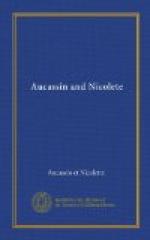They slept, who would have stayed her flight;
(Full fain were they the maid had died!)
She dropped adown her prison’s height
On strands of linen featly tied.
And so she passed the garden-side
With loose-leaved roses sweetly set,
And dainty daisies, dark beside
The fair white feet of Nicolete!
Her lover lay in evil plight
(So many lovers yet abide!)
I would my tongue could praise aright
Her name, that should be glorified.
Those lovers now, whom foes divide
A little weep,—and soon forget.
How far from these faint lovers glide
The fair white feet of Nicolete.
ENVOY.
My Princess, doff thy frozen pride,
Nor scorn to pay Love’s golden debt,
Through his dim woodland take for guide
The fair white feet of Nicolete.
GRAHAM R. TOMSON
THE SONG-STORY OF AUCASSIN AND NICOLETE
’Tis of Aucassin and Nicolete.
Who would list to the good lay
Gladness of the captive grey?
’Tis how two young lovers
met,
Aucassin and Nicolete,
Of the pains the lover bore
And the sorrows he outwore,
For the goodness and the grace,
Of his love, so fair of face.
Sweet the song, the story sweet,
There is no man hearkens it,
No man living ’neath the sun,
So outwearied, so foredone,
Sick and woful, worn and sad,
But is healed, but is glad
’Tis so
sweet.
So say they, speak they, tell they the Tale:
How the Count Bougars de Valence made war on Count Garin de Biaucaire, war so great, and so marvellous, and so mortal that never a day dawned but alway he was there, by the gates and walls, and barriers of the town with a hundred knights, and ten thousand men at arms, horsemen and footmen: so burned he the Count’s land, and spoiled his country, and slew his men. Now the Count Garin de Biaucaire was old and frail, and his good days were gone over. No heir had he, neither son nor daughter, save one young man only; such an one as I shall tell you. Aucassin was the name of the damoiseau: fair was he, goodly, and great, and featly fashioned of his body, and limbs. His hair was yellow, in little curls, his eyes blue and laughing, his face beautiful and shapely, his nose high and well set, and so richly seen was he in all things good, that in him was none evil at all. But so suddenly overtaken was he of Love, who is a great master, that he would not, of his will, be dubbed knight, nor take arms, nor follow tourneys, nor do whatsoever him beseemed. Therefore his father and mother said to him;
“Son, go take thine arms, mount thy horse, and hold thy land, and help thy men, for if they see thee among them, more stoutly will they keep in battle their lives, and lands, and thine, and mine.”
“Father,” said Aucassin, “I marvel that you will be speaking. Never may God give me aught of my desire if I be made knight, or mount my horse, or face stour and battle wherein knights smite and are smitten again, unless thou give me Nicolete, my true love, that I love so well.”




